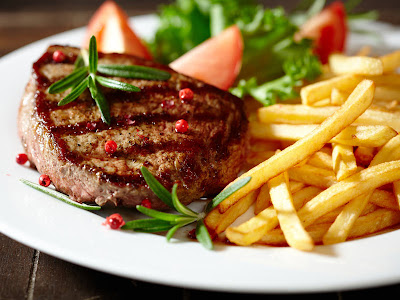Cleveland Clinic researchers discover new link between heart disease and red meat
 |
Steer clear of steak. A new study suggests that how gut microbes break down red meat raises the risk of heart disease.
Credit: iStockphoto/Thinkstock
|
Our guts are awash in bacteria, and now a new study fingers them as culprits in heart disease. A complicated dance between the microbes and a component of red meat could help explain how the food might cause atherosclerosis. The work also has implications for certain energy drinks and energy supplements, which contain the same nutrient that these bacteria like chasing after.
Red meat is considered bad news when it comes to heart health, although studies aren't consistent about how much can hurt and whether it always does. Furthermore, it's not clear which components of meat are doing harm. Various studies have considered saturated fat or sodium but the results are inconsistent and sometimes depend on whether meat has been processed or not. Stanley Hazen, the section head of preventive cardiology and a biochemist at the Cleveland Clinic in Ohio, wondered whether another ingredient might be harmful: L-carnitine, a nutrient that helps transport fatty acids into the cell's energy powerhouses, the mitochondria. L-carnitine is a popular additive to energy drinks and supplements that claim to boost energy levels. In food, the highest levels of L-carnitine are in red meat.
Hazen's focus on L-carnitine was something of a wild guess based on earlier work he'd done. Two years ago, he and his colleagues published a paper in Nature identifying a compound in the blood called trimethylamine N-oxide (TMAO). It seemed to correlate with future heart disease risk and cause heart disease when fed to mice. TMAO is created when intestinal bacteria break down certain compounds in foods. Hazen wondered if the bugs might also convert L-carnitine to TMAO, which, in turn, could put the heart at risk.
To find out, Hazen, his Ph.D. student Robert Koeth, and their colleagues bought a George Foreman grill and started cooking steaks. "People lined up for the study," Hazen says, and participants "tended to be young, hungry students." Blood tests administered afterward revealed a rise in TMAO levels. This showed that something was converting L-carnitine to TMAO, but the researchers couldn't say yet that the culprits were bacteria. To pin this down, they gave five of their volunteers broad-spectrum antibiotics for a week to suppress gut microbes and then repeated the experiment. This time, there was virtually no TMAO in the blood or urine after the volunteers ate steak, suggesting the conversion couldn't happen without bacteria present.
"When you measure things in people's blood, you don't think of [them] as coming from bacteria," Hazen says, but in this case that appears to be what's happening. The finding is the latest in a series of studies that have shown that the population of bacteria in our guts—collectively known as the gut microbiome—can influence everything from weight loss to brain chemistry.
As the researchers describe today in Nature Medicine, mice fed a diet supplemented with L-carnitine for 15 weeks had much higher levels of TMAO than control animals. Animals getting extra L-carnitine had about double the burden of atherosclerosis in their arteries compared with mice eating a normal diet.
And the intestines of the mice getting extra L-carnitine also adapted, becoming enriched for various classes of bacteria that could more readily convert L-carnitine to TMAO. This hinted that people who eat lots of red meat might be especially efficient at converting L-carnitine to TMAO and that consuming the food in moderation could be less harmful because the conversion might be more sluggish. Twenty-three vegans and vegetarians given L-carnitine supplements were, Hazen's group found, less able to synthesize TMAO than those who regularly ate red meat.
It's still unclear why TMAO seems to promote atherosclerosis. Work by Hazen's group hints that TMAO seems to make it easier for immune cells in the arteries to accumulate cholesterol. Another mystery is how other foods containing L-carnitine might impact TMAO levels. For example, fish, which is thought to lower cardiovascular risk, also contains much lower levels of L-carnitine, as do chicken and milk, notes Dariush Mozaffarian, an epidemiologist at the Harvard School of Public Health in Boston who has studied meat and heart disease, in an e-mail. Inconsistencies also remain about how harmful red meat really is. That said, although more work needs to be done to tease apart the L-carnitine-microbe connection in people, "these findings may turn out to be seminal in the field," Mozaffarian writes.
"It tells a very compelling story," says Daniel Rader, a preventive cardiologist at the University of Pennsylvania. The best way to determine exactly how L-carnitine affects cardiovascular disease, he says, is with a clinical trial that manipulates how much L-carnitine people are taking in. Whether a trial like that is feasible, though, this study "at least would suggest—well, even if you've controlled your LDL [cholesterol]" with medication, "eating red meat might still be bad for you."





